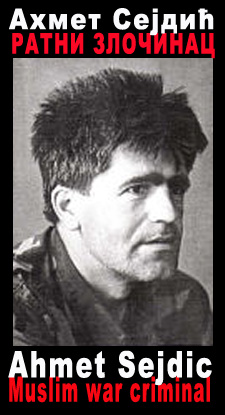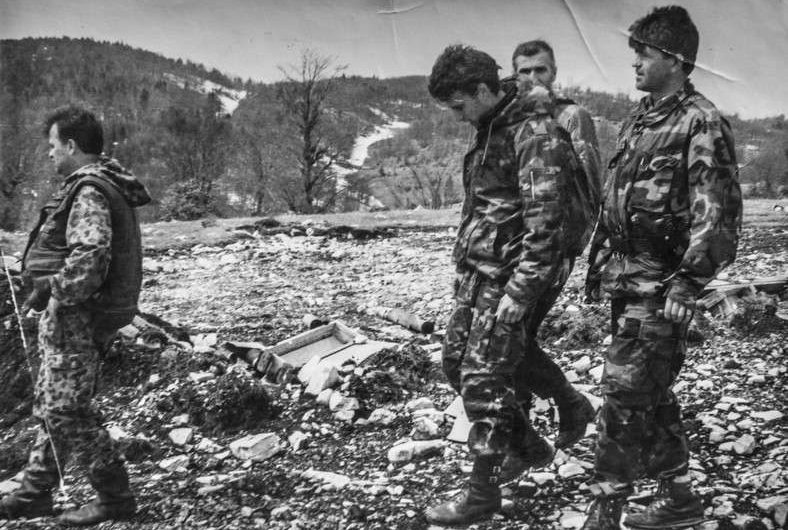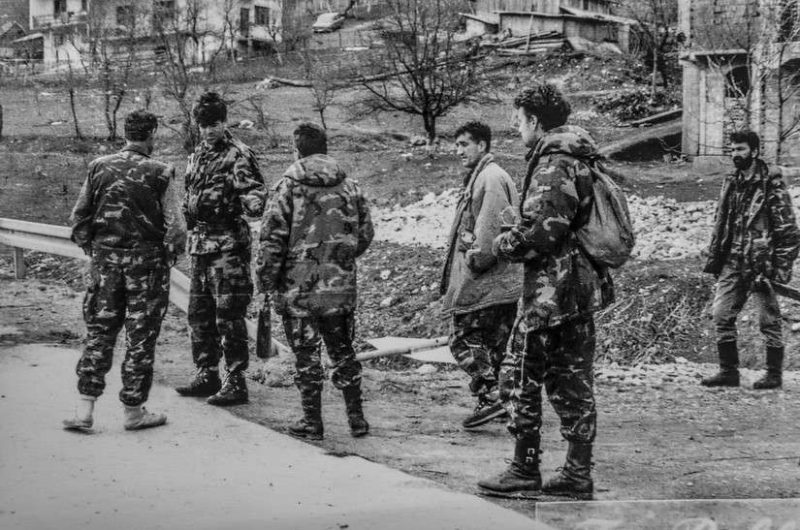Period:
Yugoslav Wars
Region:
Bosnia
The Muslim criminal Ahmet Sejdić - Bosnia 1992
Ahmet Sejdić (1960) was the war commander of the 1st Višegrad Brigade of the Muslim Drina Corps of the Army of Bosnia and Herzegovina, during the Bosnian-Herzegovinian war in the 1990s.
He was involved in numerous crimes and ethnic cleansing actions and war crimes against Serbs in eastern Bosnia and Podrinje: Jelasnica, Brodari, Višegrad, Goražde, Tebuško Brdo, Bučje, Dolani, Memerišje, etc.

For his services in the war of the 1990s, he was awarded the "Golden Lily" order, the highest military recognition in B&H. After the Bosnian-Herzegovinian war, he moved with his family to Sarajevo. Not until November 2015 was an indictment filed against him before the State Court of Bosnia and Herzegovina; comprising 11 counts. By a court decision, he was acquitted of all charges on July 16, 2019.
He wrote two books about his wartime activities in the 1990s, in which he gives some details.
BIOGRAPHY
Ahmet Sejdić, the son of Ibra and Zemka, was born on January 2, 1960, in the village of Drokan, near Višegrad. His parents had six children. He was raised by his pious mother in the Muslim faith.
Ahmet Sejdić finished primary and secondary school in Višegrad and the Faculty of Forestry in Sarajevo. He served his compulsory military service in 1985 in Bileća, where the School of Reserve Military Officers of the JNA was located.
He was employed in the "Terpentin" paint and varnish factory in Višegrad, where in 1990 he was declared redundant. He accepted a layoff severance pay of 24 salaries and left the firm. At that time, he was living with close relatives, so he managed to build a family house in Višegrad. He married a girl named Dževad, with whom he has two daughters: Amila and Dinela.
He was a member of the League of Communists of Yugoslavia (SKJ) for a while but left it in 1987. When new parties were formed in 1990, after five decades in the Socialist Federal Republic of Yugoslavia, he did not immediately decide to join the new party, but he was very close to the leaders of the Muslim Party of Democratic Action (SDA) in Višegrad. In February 1992, he entered the so-called Višegrad Crisis Staff, formed by Muslim authorities. Ahmet Sejdić lost his brother, sister, and father in the war of the 1990s.
After demobilization from the army in 1996, he moved to Sarajevo with his family and returned to work in the private sector.
WAR CRIMES
Ahmet Sejdić played a notable role in the genocide against the Serb population in the region of Podrinje, ie the municipality of Višegrad where he was born, and later in Goražde, when the JNA liberated Višegrad. His unit was commanded by the 1st Višegrad Brigade of the so-called Muslim Corps. The B&H Army had a strength of about 2,000 soldiers during the armed conflict.

Ahmet Sejdić in uniform, far right
According to data collected by the Committee for the Investigation of Crimes in the Former Yugoslavia in 1998, the following actions are attributed to Ahmet Sejdić:
He is responsible for the war crime of killing civilians. The appointee, together with other members of the Muslim armed forces, took part in the attack on the Serbian village of Jelašci near Višegrad on August 1, 1992. On that occasion, they killed 10 Serb civilians, including two minor children, described in DC RS Document no. I-11;
He is responsible for organizing and carrying out the armed attack on 09.09.1992. on the route to Brodari near the confluence of the Lim and the Drina Rivers in the area of the municipality of Rudo. On that occasion an ambulance was attacked, in which Dr. Jojović Stojana and nurse Kastratović Ljubica were killed;
He is responsible for organizing and carrying out an armed attack on the territory of the municipality of Višegrad and on that occasion killed 10 Serb civilians with firearms, including 2 minor children, as stated in CP Committee report no. I-213;
He is responsible for organizing and carrying out armed attacks by the Muslim police and army during the period from May 1992 to mid-1994 in the area of the municipality of Goražde in which 145 Serb civilians were killed, listed in the CP Committee report no. I-199;
He is responsible for participating in the organization and direct commission of crimes against the Serb population in 33 villages and the killing of three civilians in those villages, the names of which are given by the KP. During these attacks, they looted houses and set them on fire, and in the course of the murders they committed unprecedented horrific atrocities against Serb civilians;
He is responsible for the arrest of Serb men, women, and children between July 1992, 44 of whom were taken to Trebuško brdo where they were beaten with arms, legs, and rifle butts, so that many were bloodied and injured and had difficulty moving; some had their ears nailed to posts;
He was responsible for organizing and commanding the Muslim army for the attack on the village of Bučje on July 14, 1992; arresting Serbs, taking them to Trebeško brdo where they were imprisoned in basements and buildings. There, they were mistreated, beaten with rifle butts and batons on their backs and other parts of their bodies until they lost consciousness. Knives were placed under their necks and in front of their eyes and they had a Muslim emblem, a crescent, and a star engraved on their bodies with knife tips, and an SDA mark on the back. Their ears were pierced or nailed to beams in the basement of the building;
He was responsible for organizing and participating in the capture of members of the Territorial Defense of the Serbian Army on September 16, 1992, in Memerišje, near Višegrad, where they were tortured, beaten with batons, wooden sticks, legs and arms, and rifle butts, and thrown, after having been beaten, down the stairs. Ljubinko Davidović died from his injuries. They were also intimidated, forced to shoot at each other, and were exposed to starvation. Prisoner Slobodan Tanasković died of physical abuse, exhaustion, and cold;
He was also responsible for participating in the burial of another 25 Serbian soldiers from Dvolog on January 21, 1993, on the hill of Strmica, Dolani in the municipality of Rudo, some of whom were merely wounded. Due to starvation, physical and mental torture in difficult living conditions, the health of the prisoners was damaged, and their body weight was halved;
He was responsible for searching and looting Serb apartments, arresting Serb civilians, torturing them with hail and putting barrels of weapons and knives under their throats, and making various threats against civilians between May 1992 and May 1994.
CAREER AND MEDALS
In 1992, he became the commander of the First Višegrad Brigade
In 1993-1994, he became the chief of staff of the East Bosnian operative group of the so-called Muslim Army of B&H
1995-1996 he served as commander of the 808th Brigade of the so-called Muslim Army of B&H.
He was awarded the "Golden Lily" award, which is awarded by the Presidency of B&H. At his request, he was demobilized from the so-called Muslim Army of B&H in 1996 with the rank of Colonel.

Sejdic's departure for the task of cleansing Serbs
AFTER THE WAR
Despite all the evidence, Ahmet Sejdić was not arrested for many years for crimes against the Serbian people. The indictment filed by the Military Court in Belgrade in 1996 was not executed.
And by the decree of the President of the Presidency of Bosnia and Herzegovina, his brigade was awarded the prefix "famous".
INDICTMENT AND TRIAL
On November 17, 2015, the Bosnian-Herzegovinian Prosecutor's Office, in cooperation with the War Crimes Prosecutor's Office from Belgrade, issued a warrant to SIPA agents for the arrest of Ahmet Sejdić and two other former members of the so-called Muslim Army of Bosnia and Herzegovina during the 1990s.
The trial of the accused Sejdic began in May 2016 in Sarajevo.
The indictment contained 11 counts, charging using Sejdić with war crimes, inhumane treatment of prisoners of war, and crimes against humanity in the regions of Goražde, Višegrad, and Ruda between 1992 and 1993. It is stated that Ahmet Sejdić was responsible for: planning, assisting, and participating in the illegal arrest of over 100 Serbs, including children under the age of 13.
Two people died as a result of inhumane conditions in the Muslim camps in Goražde. In addition, he was charged with the permanent displacement of Serbs from the lower part of Podrinje in Bosnia.

The trial lasted more than three years, and on July 11, 2019, the State Court in Sarajevo acquitted him on all counts of the indictment. The judgment reasoned the decision as follows:
- "The presented evidence was not sufficiently strong to harm the accused, ie. to find the accused guilty," said the chairman of the Judicial Council, Mira Smajlović.
This decision was greeted with great enthusiasm among the Muslim population in Bosnia and the diaspora, while the families of the victims from the Podrinje region were indignant.
Tags:
Please, vote for this article:
Visited: 3109 point
Number of votes: 7
|